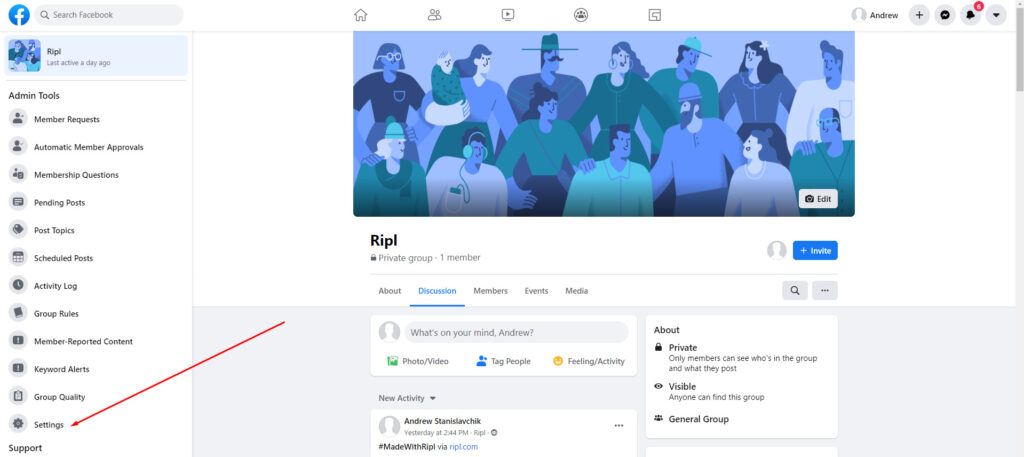You’ve probably heard that there are two types of Facebook pages: personal and business. But what you might not realize is that there are also two types of Facebook groups: public and closed. So what is the difference between a Facebook page and a group? Which one should you use for your business? Let’s take a closer look at each type to help you decide.
Overview of Facebook Pages
A Facebook Page is a public profile that you create for your business, brand or organization. It’s a great place to share news, updates and insights about what you’re doing with your customers and fans. People can like your Page to stay up-to-date with your latest posts, and you can also send them updates by posting to your Page. Pages also have a custom URL, so they’re easy to find and remember.
Overview of Facebook Groups
So you’ve created a Facebook group for your business. Good move! Groups are a great way to connect with your customers and build relationships with them. But what’s the difference between a group and a page?
Here’s a quick overview:
- Pages are for businesses, brands and organizations. Groups are for people.
- They can have an unlimited number of fans, but groups can only have up to 5,000 members.
- Anyone can create them, but groups must be approved by Facebook.
- Pages can be configured to allow anyone to post content, while groups are moderated. This means that group members can post content only if the group administrator approves it.
- Pages are administered through a dashboard, while groups are administered through a separate group page.
Best Practices for Setting Up a Page or Group
When it comes to setting up a Facebook Page or Group for your business, there are some key things to keep in mind.
- For Pages: Think carefully about the name you choose and make sure it’s easy to remember and clearly linked to your business. Also, it’s important to have a good profile picture that is either your logo or image that reflects your brand.
- For Groups: Think about who should be in charge of posts and whether you want conversations to be open or moderated. Make sure there are clear rules and guidelines to ensure members stay on topic with posts.
Finally, no matter what you chose, take the time to fill out all fields in the settings section, such as description and contact details. This will make sure visitors have a good first impression when they come across your page or group. Taking these steps will help ensure the success of your Facebook presence!
How to Run a Successful Page or Group


When it comes to running a successful Page or Group, the key is to engage with your audience. Whether it’s sharing valuable information and resources, encouraging dialog, or providing feedback and support—engaging with your community is essential.
On Pages, you can also use insights to track the performance of posts and get an idea of which content your audience likes best. For Groups, you have slightly more control over who can post content and comment on existing posts. You should also consider setting rules for both Pages and Groups to ensure that people are following the same code of conduct. This can help keep conversations respectful, on-topic and free from spammy content.
At the end of the day, Pages or Groups with successful engagement are those that are regularly updated with fresh content and responded to in a timely manner. It’s also important to make sure your Page/Group looks professional—use a recognizable profile photo and cover image that accurately reflect your brand identity. Both are considered part of your digital PR, so be thorough in your visual representation.
What Are the Differences in Features and Settings?
The more you know about the capabilities of each type of page, the better you’ll be equipped to make decisions that work for your project. Pages and Groups both have unique features and settings that make them uniquely suited to different purposes:
- Pages are great for long-term projects or campaigns with a fixed end date. You can establish rules and guidelines, create events, post updates, and share content. You also have the ability to track engagement analytics.
- Groups are best suited for short-term projects or campaigns with a variable end date. They’re great for having conversations within a smaller group setting and fostering community. They’re also easier when it comes to managing conversations. You can moderate conversations, assign roles to members, establish policies and guidelines, and keep your group more organized in general.
How to Use Both Effectively


Now comes the question of how to use both Facebook Pages and Groups effectively. First, determine whether you need a page or a group. There’s no hard and fast rule here—it really depends on your goals and objectives. Generally speaking, if you’re looking to build an audience or increase brand visibility, then Pages are the way to go. But if you want to cultivate relationships or create a sense of community, then Groups might be a better fit.
Once you know what kind of entity to use, it’s important to create content that reflects your goals. For example, Pages should focus on content that appeals to a wide range of audiences while Groups should be more tailored towards members’ interests, needs and questions.
Finally, encourage engagement. Commenting on posts is great for engaging members in a public manner but private messaging is also important in creating more meaningful connections with people in either Page or Group setting.
Important Things to Remember
So, let’s review the key distinctions between a Facebook page and a Facebook group: Pages are public profiles best suited for businesses, organizations, and public figures. Groups are private forums designed to facilitate conversations and collaboration between members.
When deciding whether to create a page or a group, it’s important to consider your goals. Many organizations opt for both – a page for marketing and promotion, plus a group to foster community engagement among members.
Also, remember that your page could be seen as an extension of your brand’s personality. If you’re looking to use it as part of your marketing strategy, make sure the content you share promotes your brand in the right way while keeping users engaged and entertained. Lastly, keep in mind that pages offer more insights into analytics than groups – so if you’re looking for measurable results from the content you post on Facebook, investing in a page may be well worth it!
Tips for Choosing Between a Page or Group
Now that you understand the basics of the difference between Facebook Pages and Groups, it’s time to decide which option is the best for your business. Here are some tips to help you choose between the two:
- Is your main goal to create content or foster a community? If you’re looking for a space to post content, a Facebook Page is your best bet. However, if you’re searching for a platform to build relationships and engage with your audience in a more intimate way, opt for a Group.
- Are you looking for a permanent home? Pages deliver longevity, as they have no limit on members, so it’s the way to go if long-term commitments are what you need. Groups offer an ephemeral, in-the-moment kind of experience.
- Do you want control or freedom? Pages require moderators who actively manage posts and comments made by users. This can be helpful if you’re trying to maintain control over the types of conversations taking place in your space. However, if moderator involvement isn’t in your game plan, Groups offer a much more organic user experience.
Ultimately, both options can be great markting tools when used correctly—it just depends on what kind of interaction you hope to cultivate with your followers. Consider these tips carefully and make sure that whichever direction you choose aligns with your overall business strategy and goals.
Conclusion
Facebook Pages and Groups both have their own unique benefits, and it’s important to understand the difference between the two before creating one or the other. Pages are perfect for businesses, organizations, and public figures who want to create a professional presence on Facebook. Pages can be customized with a cover photo, profile photo, and about section, and can be used to share updates and links to articles, products, or other content.
Groups are perfect for small groups of people who want to connect and share content with each other. Facebook Groups can be used to discuss topics of interest, plan events, or share information and resources.





















Leave a Reply
View Comments